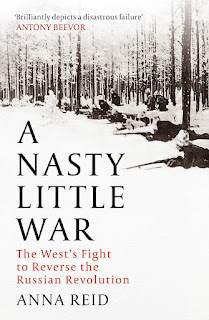This is Anna Reid's new book, looking at the West's fight to reverse the Russian revolution. The Allied interventions in support of a mixed bag of White warlords were undoubtedly nasty, but it wasn't that little. Some 180,000 allied troops from 16 countries participated, with varying degrees of enthusiasm. The conflicts ranged from the far north to Siberia, the Black Sea and Poland.
The nastiest element, which clearly shocked the author, was the consistent antisemitism. The White armies often spent more time carrying out pogroms than they did fighting the Bolsheviks. But what surprised the author was the frequent antisemitic jibes in the diaries of British officers. British officials and government ministers, including Churchill, at best, turned a blind eye to the atrocities that probably killed up to 200,000 Jews. General Holman, commanding the British military mission, was 'obsessed by the idea of wiping out the Jews everywhere, and can talk of little else'.
Churchill's hatred of the Bolsheviks drove British policy until Lloyd George and the rest of the cabinet eventually had enough. When the PM was considering recognising the new regime, Churchill burst into his hotel room saying, 'One might as well legalise sodomy'. There was also resistance at home, with dockers refusing to load aid convoys to the Whites. What aid that did arrive was often stolen by corrupt officers. Admiral Kolchak fled Omsk in seven trains, six for his mistress and staff and another for £65m of gold bullion.
The early focus was on securing ports to bring in supplies. Murmansk in the north and Vladivostock in the east. PoWs were used to construct a rail link to Murmansk, killing 25,000 of them in the process. All were supervised by the British commander. The British army guide was a gem of colonial attitudes, advising troops to treat the Russians as children. The Americans brought somewhat more enlightened views, but also the Spanish flu, which killed countless more civilians.
The author takes us through each theatre of operations. The Whites had some success in the South, but it didn't last. The Bolsheviks had the advantage of interior lines, which allowed Trotsky to shift troops from one theatre to another. The Whites had no common ideology other than antisemitism and failed to coordinate their operations.
When the allies eventually pulled the plug, the permanent secretary to the Foreign Office added a note to the file, 'So ends a not very creditable enterprise, to which Lord Curzon crossed out 'not very' and substituted 'highly dis'. Unsurprisingly, no official histories of the conflict, campaign medals or monuments exist. It was all quickly forgotten. Anna Reid has done a great job reminding us of this great folly.

This comment has been removed by the author.
ReplyDeleteGonna have to pick this up, been planning to use these guys in a project soon...
ReplyDeleteIt has the advantage that you can use late war figures from 16 countries. Even the White Russian armies had plenty of allied uniforms. The author talks about how Denikin's staff looked straight out of a British staff team. Just add in some Russian Civil war figures for colour.
DeleteIt sounds a very useful book. I’ll add it to my ongoing “wants list”.
ReplyDeleteTo be honest anti-Semites were common on all sides in this conflict. Everyone seemingly wanted to find a scapegoat. Shameful all round really ☹️👎
Cheers,
Geoff
Indeed, fairly common for the period although the White Russians took it to almost Holocaust levels. I think what shocked the author was the vehemence of some British officers on the subject.
DeleteI saw this in a bookshop recently, but have plenty to read, so just took note of it. Your review/overview adds to the 'get it sometime' column. I have started reading Richard Harrison's translation of "Russian Civil War 1918–1921 An Operational-Strategic Sketch of the Red Army's Combat" as a starting point to increasing my knowledge of the Civil War. Damien Wright's "Churchill's Secret War With Lenin" is also on my shelves. Always plenty to read. You seem to get through them at an impressive pace!
ReplyDeleteRegards, James
I should read Wright's book. I got interested when researching my book on Turkey in WW2. I hadn't appreciated the impact of Churchill's intervention on Stalin's thinking, given that is where Stalin fought. In particular, another intervention through the Black Sea in 1940. It turns out it wasn't just paranoia. Churchill did take a plan to sail a fleet into the Black Sea to cut off oil supplies to the Cabinet.
Delete